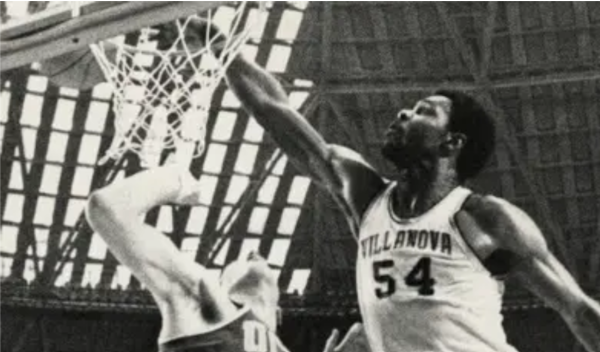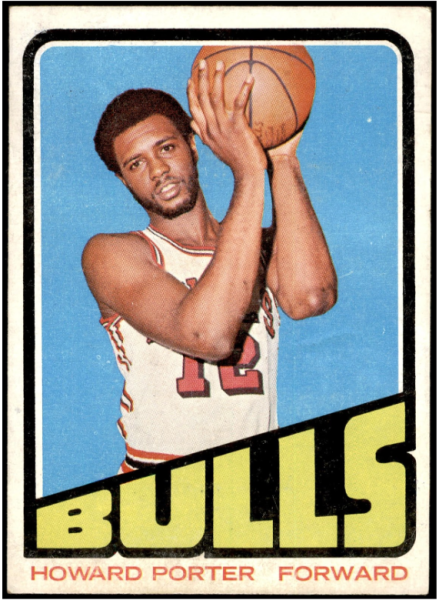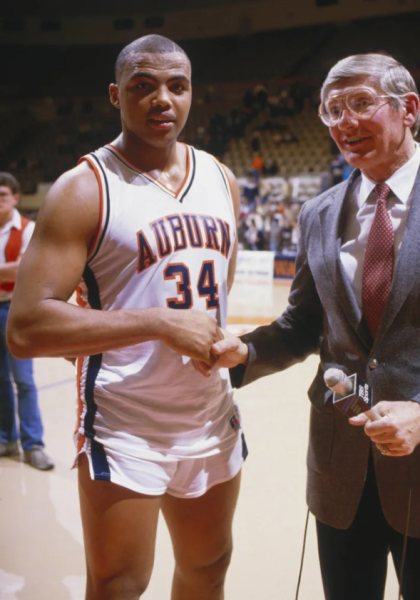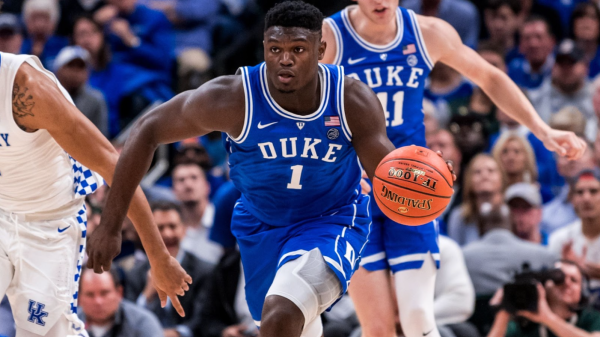 Pictured above: Howard Porter (#54) (picture from Sports Team History)
Pictured above: Howard Porter (#54) (picture from Sports Team History)
On March 27, 1971, the UCLA Bruins captured their seventh national title, and fifth consecutive championship over the Villanova Wildcats, who just gained their first National Championship appearance in program history. Villanova found themselves in the midst of an improbable run, where the Wildcats demolished an undefeated Penn Quakers team with a final score of 90-47. Despite the championship game loss, Villanova’s star forward, Howard Porter, won the tournament’s Most Outstanding Player award. Porter had averaged 23.5 points per game through the season, along with shooting an impressive 53% on the field. According to a 1971 scorecard via Sports-Reference.com, Porter had also grabbed 30 rebounds in a single game against Saint Peter’s in January 1971. He was a to-be NBA player, later selected thirty-second in the 1971 NBA Draft to the Chicago Bulls.
Yet, if you view any NCAA record books or simply perform a Wikipedia search on the 1971 NCAA tournament, there is noticeably an asterisk next to any mention of Villanova or Howard Porter. A great tournament run, a runner-up in the esteemed National Championship game, yet the NCAA does not want people to remember them. Why?
Howard Porter signed with an agent, Norman Blass, in December 1970. A contract with the ABA’s Pittsburgh Condors was to be disputed soon. Due to this, the NCAA never awarded Porter his well-deserved Most Outstanding Player Award. “To this day, I’ve never seen that trophy,” Porter stated, as reported by a 1996 Sports Illustrated article. “There was no presentation after the game. That tells me the NCAA knew exactly what it was going to do next. They knew before the tournament began, but they wanted to put those 35,000 or whatever into the Astrodome first. Then they moved.”
 Pictured above: A 1972 trading card of Howard Porter during his time with the Chicago Bulls (picture from Amazon)
Pictured above: A 1972 trading card of Howard Porter during his time with the Chicago Bulls (picture from Amazon)
Simultaneously, as Porter moved into Chicago to sign a one-year, $72,000 contract with the Bulls after the Bulls and Condors settled on the rights to Porter, Villanova University forfeited their victories since December 16, 1970. The 1971 Villanova season was, as a result, vacated. Porter unfortunately suffered a fate of obscurity, playing for four teams–the Bulls, New York Knicks, Detroit Pistons, and New Jersey Nets–in seven seasons. Sports Illustrated writes, “His ball handling was weak. He’d never had to dribble much before joining the pros; he could jump over every defender, get off his shot. He could move, bound, fly. In the pros he was hampered by a chronic ankle injury, and he couldn’t move as well. He was a pro player but never a star.” Porter’s career ended on a blood clot from an injury that had dislodged into his lung, a possible life-ending incident. Porter subsequently fell into cocaine addiction,was arrested in 1985 for drug possession, and faded out of the public eye. He spent his final years working as a probation officer for Ramsey County in Minnesota following his drug abuse, leading up to his death in 2007.
The Most Outstanding Player award for the 1971 NCAA Tournament has since been marked as “vacated”, with an asterisk alongside the term. Howard Porter’s name was, and most likely never will be, remembered. Porter’s decision to sign with an agent was considered so taboo by the NCAA that his name is forever forced to be forgotten.
Let’s flash forward to the present-day NCAA. Fifty years later is a bit of a stretch to such an argument but the NIL ruling was passed in June 2021, allowing college athletes to be paid off of their name, image, and likeness. Players can profit off of their name, work with businesses and corporations, and most importantly, sign with an agent to easily get their name represented, and earn money. This is a massive deal for the NCAA, as the prospect of college athletes being paid has always been a major debate.
So fifty years after an award was taken away for the exact thing the NCAA is now promoting, it’s perfectly fine and perfectly legal for NCAA athletes to get paid boatloads of money to attend a college. This isn’t new at all. Look back to Charles Barkley, the all-time NBA superstar, whose “humble” roots were at Auburn University. Barkley led Auburn to their first NCAA tournament in school history in 1984, and Barkley had won SEC Player of the Year and was named to the All-SEC First Team that same year. He also won the MVP award of the SEC Tournament in 1984 and had his jersey number of #34 retired by the Tigers. He would then be drafted fifth overall to the Philadelphia 76ers, and the rest is history.
 Pictured above: Charles Barkley (#34, left) (picture from Getty Images)
Pictured above: Charles Barkley (#34, left) (picture from Getty Images)
Why is “humble” in quotations? In a 2014 interview, Barkley spoke about the idea of college players being paid and subsequently revealed his own college earnings. His own, highly illegal college earnings. The Yard Barker states that Barkley claimed, “I think the most I took was like $20,000. I’m not talking about a million dollars. It made me stay in school another year. $20,000, that’s not a lot of money, but I was able to do some stuff for my mother and grandmother, and I had some spending money. OK, I’m cool. I don’t have to go into the real world or the NBA after one college season.” Barkley outright admitted that he willingly took money from Auburn, against the morals of the NCAA, yet no titles or awards have been stripped. In fact, the 1984 NCAA records do not have an asterisk next to Auburn or Barkley’s namesake. The NCAA will relish Barkley’s Auburn years.
Now, a question of this rests in whether the NCAA would have vacated Barkley’s accomplishments if they knew about the money he was receiving at the time, just as the NCAA vacated Villanova’s wins immediately after the 1971 season. Look no further than the vacated wins of the Louisville Cardinals teams from 2010 to 2014, which was the result of a scandal involving Louisville head coach Rick Pitino and director Andre McGee. McGee was a former Louisville player and had paid thousands of dollars for striptease dances and other sexual acts to be performed on Louisville recruits and players on the roster between December 2010 and June 2014. Yahoo! Sports exposed this news in October 2015, an entire year after the incidents occurred. As a result, the 2013 championship victory by Louisville was vacated, along with Louisville’s tournament appearances in 2012, 2013, 2014, and 2015. If the hammer is to go down on older cases of NCAA violations, as shown by the NCAA taking down Louisville a year after the incidents took place, a vacating of the Auburn success in the Barkley era could be possible. However, the NCAA will not vacate Auburn, it’s never even been a conversation. There is also a major moral division between the promotion of stripteasing recruits compared to simply hiring an agent to look ahead in your career.
Taking a deeper, and another recent look at an NCAA violation went untouched, Duke superstar Zion Williamson, the number one recruit in the Class of 2018, and someone who was considered a generational talent with his size and leaping ability. Williamson was chosen with the first overall pick in the 2019 NBA Draft to the New Orleans Pelicans and has been a sweetheart in the eyes of the NBA media ever since. In a 2020 lawsuit against Williamson’s former marketing representative Gina Ford and her company Prime Sports, Williamson was asked to admit and confirm a number of incriminating facts, in the eyes of the NCAA, at least what should very well be. A number of facts Williamson was asked to admit was, “Sharonda Sampson, Williamson’s mother, and Lee Anderson, his stepfather, ‘demanded and received gifts and economic benefits from persons acting on behalf of Duke University (directly and/or indirectly) to influence [Williamson] to attend Duke University to play basketball.’” Williamson’s family was also allegedly given gifts from Nike, the sponsor of Duke athletics, to play for Duke. Adidas representatives were also involved and attempted to give benefits to Williamson to persuade him to play for an Adidas-sponsored university.
To lead right into the direct involvement of Williamson’s potential breaking of NCAA ruling, ESPN reports that another statement Ford’s team wanted Williamson to admit was that, “Before becoming a student at Duke, Williamson ‘or person(s) acting on [his] behalf (including but not limited to Sharonda Sampson and Lee Anderson) accepted benefits from an NCAA-certified agent that are not expressly permitted by the NCAA legislation’ between Jan. 1, 2014, and April 14, 2019.”
 Pictured above: Zion Williamson (#1) (picture from Duke Athletics)
Pictured above: Zion Williamson (#1) (picture from Duke Athletics)
Let’s say Williamson and the 2019 Duke team, right now in 2023, three years removed from findings of violations, had their 32-6 season vacated, and their supporting Elite Eight season removed from NCAA record books. Outrageous, right? So why is it so ridiculous to fight for the 1971 Villanova team to remain untouched in the record books, and for Porter’s family to receive his Most Outstanding Player award?
Inside Higher Ed reports that “NCAA Division I athletes reportedly earned an average of $3,711 in the first year of NIL.” The NIL practically promotes free agency in college sports, with whatever school can offer the most money being the school that top athletes go to. The FanArch blog states, the “NIL could lead to a loss of team cohesion and a focus on individual success. While some athletes may be able to secure lucrative deals, others may not have the same opportunities. This could create a division within teams and lead to a lack of teamwork and camaraderie. The focus may shift from team success to individual success, resulting in a decline in the overall quality of college sports.” It’s surely a great thing that college players are able to be paid, as they deserve to get a grounding in their careers and promote themselves off their images, but it is an extremely abused benefit. When a college basketball player can receive a deal or total NIL valuation of upwards of millions of dollars, and this is now considered legal by the NCAA, why do old cases of attaining money still hold an asterisk? Yes, it’s a clear battle of historical rules versus current rules, but the punishment that the 1971 Villanova team has held through fifty-two years is extremely unfair, especially in the eyes of the NIL and its effect on the college sports world today.
Former Supreme Court Justice Louis Brandeis set a revolutionary precedent in his tenure from 1916 to 1939. He stated that “individual rights guaranteed by the Constitution ought to be seen as evolving and expanding along with the development of technology and progression of society.” In layman’s terms, the Constitution is to be obeyed not exactly as it is written, but it is to be interpreted as society is changed and the rules of society at the time of the case interpreting the document. To connect this back to the NIL, to take after Brandeis, the NCAA should look into the 1971 Villanova team’s case and view the unfair vacating of their wins and awards and remove the asterisk. In the wake of nearly every college athlete getting a hefty pay to play for their respective programs, Louis Brandeis’ philosophy should stand strong among the heads of the NCAA as they review the case. Justice should be brought to the late Howard Porter, a fantastic college basketball player the NCAA has unjustly forced everyone to forget.
